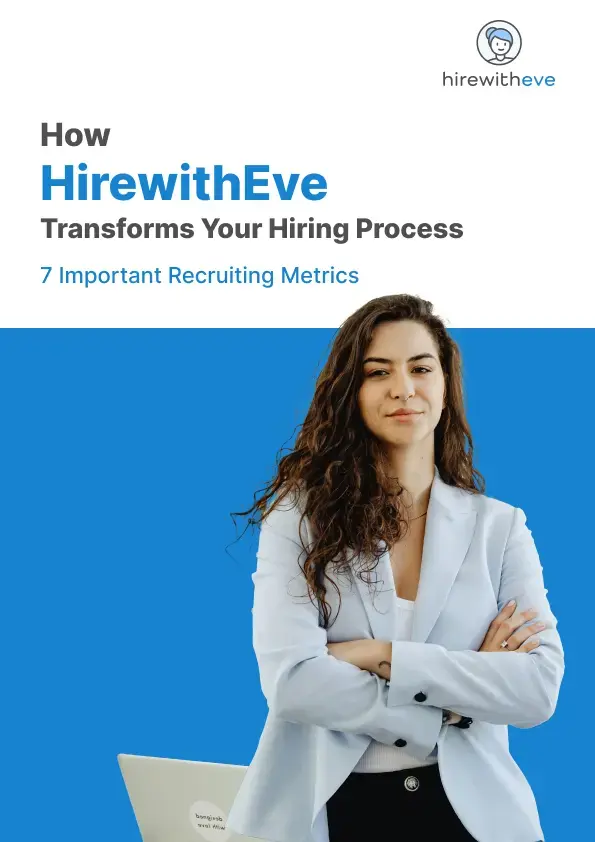How to Build HR Business Partner Skills of the Future
How to Build HR Business Partner Skills of the Future

In today's rapidly evolving business landscape, the role of HR Business Partners (HRBPs) is transforming. More than ever, organizations rely on HR professionals who can not only manage talent but also play a strategic role in driving business outcomes. Developing HR Business Partner Skills of the future is essential for staying ahead in a competitive market, and HR managers and talent acquisition specialists must prioritize this skill-building process. This blog explores how HR professionals can build and enhance HR Business Partner Skills to meet the demands of tomorrow’s workforce.
Table of contents
Introduction
In today's rapidly evolving business landscape, the role of HR Business Partners (HRBPs) is transforming. More than ever, organizations rely on HR professionals who can not only manage talent but also play a strategic role in driving business outcomes. Developing HR Business Partner Skills of the future is essential for staying ahead in a competitive market, and HR managers and talent acquisition specialists must prioritize this skill-building process. This blog explores how HR professionals can build and enhance HR Business Partner Skills to meet the demands of tomorrow’s workforce.
The Evolving Role of HR Business Partners
The role of HR Business Partners has changed significantly over the past decade. Traditionally, HR professionals focused on administrative tasks, but now their role has expanded to include strategic business functions. HR Business Partner Skills are no longer just about managing employee relations or handling payroll; they now encompass strategic alignment with business goals, talent management, and data-driven decision-making.
To stay relevant, HR Business Partners need to adopt a forward-thinking approach that combines people skills with technology and analytics. As businesses continue to adopt remote work and flexible work arrangements, HR Business Partner Skills must evolve to address these new realities. The ability to engage a diverse, geographically dispersed workforce while maintaining a strong company culture is a key component of the future HRBP role.
Key Skills HR Business Partners Need for the Future
Developing HR Business Partner Skills for the future requires a focus on several critical areas:
1. Data-Driven Decision Making
Data analytics is revolutionizing the HR field. HR Business Partners of the future must be skilled at leveraging data to drive decisions that align with business objectives. This includes understanding workforce analytics, employee engagement metrics, and recruitment KPIs. Proficiency in analyzing data and translating it into actionable insights will be one of the core HR Business Partner Skills in the coming years.
2. Strategic Thinking
HR professionals need to align HR practices with broader business goals. HR Business Partner Skills should include the ability to understand the organization's long-term objectives and design HR initiatives that support those goals. This involves working closely with leadership to develop talent strategies, succession plans, and workforce planning.
3. Change Management
With the business environment in a constant state of flux, HRBPs must become change champions. HR Business Partner Skills must include expertise in change management processes, helping organizations navigate transformations, whether due to mergers, technological advancements, or shifts in company culture. HRBPs need to guide employees through these changes, ensuring a smooth transition while maintaining productivity.
4. Technology Proficiency
The digital transformation of HR means that HR Business Partners must be comfortable with new technologies. HR tech tools, such as applicant tracking systems (ATS), employee engagement platforms, and performance management software, are now integral to HR operations. A future-proof set of HR Business Partner Skills includes the ability to adapt to new digital tools and help organizations leverage them for better HR outcomes.
5. Emotional Intelligence and Leadership
As HR Business Partners, managing people effectively remains a top priority. Emotional intelligence, which includes self-awareness, empathy, and interpersonal skills, is crucial for building strong relationships within the organization. Developing leadership capabilities is also key as HRBPs need to coach, influence, and inspire managers and employees alike. HR Business Partner Skills must, therefore, include a strong foundation in emotional intelligence and leadership.
How to Develop HR Business Partner Skills
Developing HR Business Partner Skills involves continuous learning and professional development. Here are some strategies HR managers and talent acquisition specialists can adopt to build these essential skills:
1. Ongoing Education and Certification
Pursuing certifications in HR, such as SHRM-CP or PHR, can provide foundational knowledge in HR practices. Additionally, HR professionals should seek opportunities for further education in business management, data analytics, and technology to round out their skill set. Webinars, online courses, and HR conferences can be valuable resources for staying up to date on the latest trends and developing new HR Business Partner Skills.
2. Mentorship and Networking
Mentorship can play a significant role in developing HR Business Partner Skills. Partnering with a seasoned HRBP or industry expert can provide invaluable insights and advice. Networking with other HR professionals through HR associations and online platforms can also expose HRBPs to diverse perspectives and best practices.
3. Hands-on Experience
The best way to develop HR Business Partner Skills is through practical experience. HR professionals should seek out projects or roles that challenge their current capabilities, allowing them to grow in areas like change management, data analysis, and strategic thinking. Volunteering for cross-functional teams or leading company-wide HR initiatives can provide hands-on experience in these critical areas.
4. Adopting HR Technology
As mentioned earlier, technology proficiency is a key part of future HR Business Partner Skills. HRBPs should become familiar with the latest HR technology solutions, such as applicant tracking systems (ATS), employee engagement platforms, and performance management tools. Implementing and utilizing these tools effectively can improve efficiency and drive better talent outcomes.
Notice Periods and Final Pay
In the UK, the notice period required for an employee termination depends on the length of time the employee has worked for the company. Statutory notice periods are as follows:
One week: For employees with one month to two years of continuous employment.
One week for each year of service: For employees with more than two years of service, up to a maximum of 12 weeks.
Employees must be paid in full during their notice period unless they are terminated for gross misconduct, in which case immediate termination may be justified. Final pay, including any owed holiday pay or bonuses, must also be settled in accordance with UK law.
Common Mistakes in Employee Termination in the UK
There are several common mistakes that HR professionals make when handling employee termination in the UK:
Lack of documentation: Without clear records of the reasons for termination, employers leave themselves open to unfair dismissal claims.
Failure to consult employees: Particularly in redundancy situations, employers must consult with employees to discuss alternatives and explain the process.
Not following a fair procedure: In disciplinary terminations, failure to follow a structured process can result in legal challenges.
Avoiding these mistakes is essential to ensuring a smooth employee termination process and protecting your organization from unnecessary legal risks.
How to Handle Employee Termination with Sensitivity
In addition to the legal aspects of employee termination in the UK, it's important to handle the process with empathy and care. Even in cases of misconduct, an employee's dignity should be respected to maintain the morale of the remaining workforce and protect the company's reputation.
Private Conversations: Conduct termination meetings in a private setting and ensure the employee has support, such as a representative or legal advisor.
Clear Communication: Be transparent about the reasons for termination and the steps taken.
Support Post-Termination: Offer resources such as outplacement services to help the terminated employee transition to new employment.
Handling employee termination with sensitivity can help minimize disruptions to the workplace and reduce the risk of disputes.
Conclusion: Streamlining Employee Termination with HirewithEve
In conclusion, employee termination in the UK is a complex process that requires careful attention to legal and procedural requirements. By following due process, consulting legal advice when necessary, and handling terminations with sensitivity, HR managers and talent acquisition specialists can avoid common pitfalls and ensure that terminations are conducted fairly.
While employee termination can be challenging, modern tools like HirewithEve can help streamline this process by providing features that support the documentation, communication, and legal compliance required in UK employment law. With integrated tools for performance tracking, automated documentation, and employee assessment, HirewithEve ensures that HR professionals can manage employee terminations efficiently while minimizing legal risks.
By leveraging these features, HR teams can focus on maintaining positive relationships within the organization, even in difficult situations like employee terminations.
Target Your Talent
Unlock tailored solutions for your recruitment and hiring needs with Eve Platform's extensive case study library.
Subscribe now to enhance your HR expertise and excel in your role.
Free Resources

Transforming Hiring: 7 Key Recruiting Metrics
Enhancing recruitment processes with data-driven insights for better hiring outcomes.

Reducing Hiring Bias with Hirewitheve.
Utilizing Hirewitheve to combat bias and streamline recruitment processes effectively.

Hiring Detail-Oriented Candidates
HirewithEve enhances hiring by accurately assessing candidate's attention to detail-oriented.
